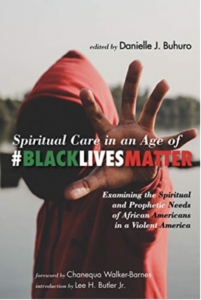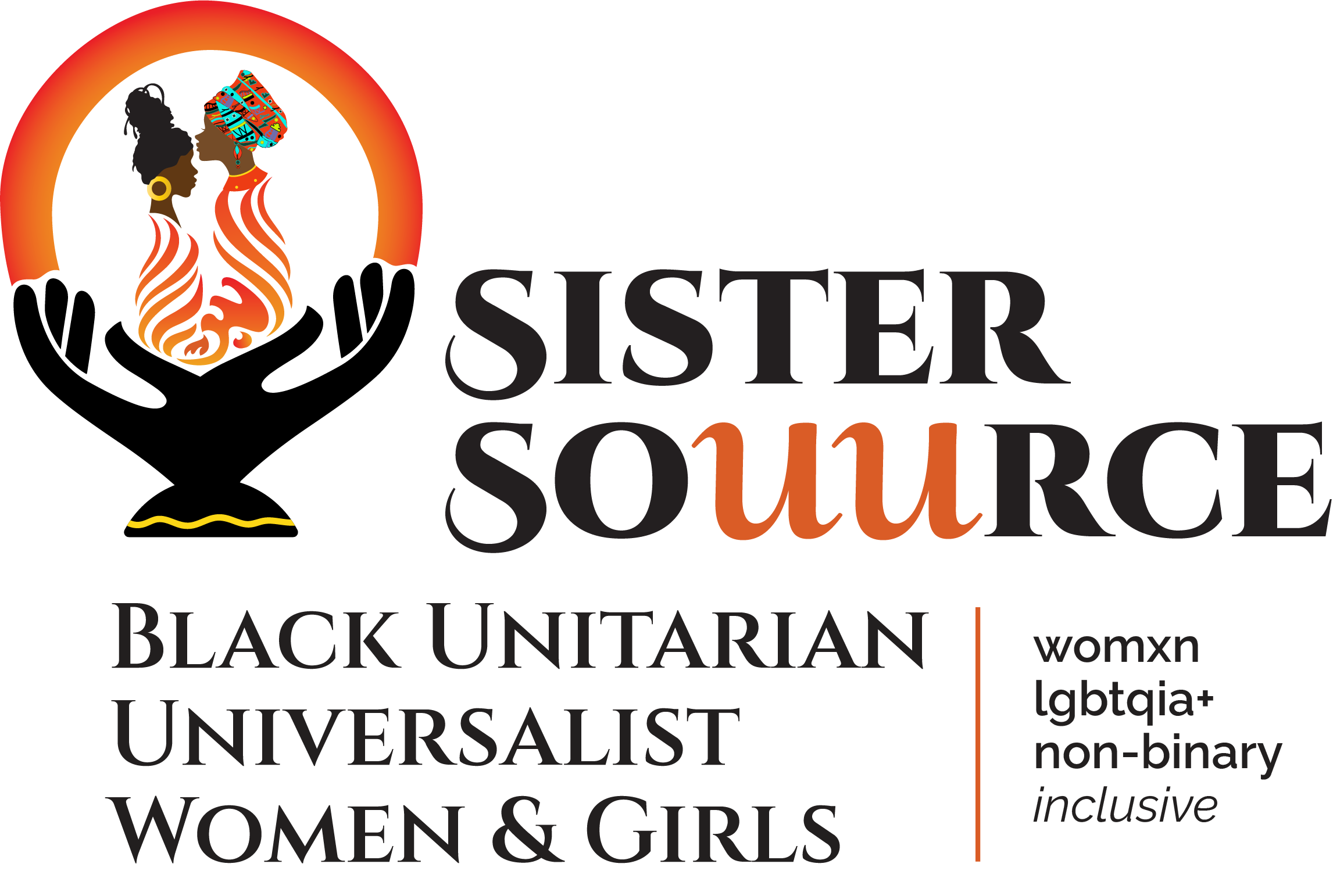
Book cover is copyrighted material used for illustrative purposes.
Book Review – Spiritual Care in an Age of #BlackLivesMatter: Examining the Spiritual and Prophetic Needs of African Americans in a Violent America, edited by Danielle J. Buhuro
“African Americans’ spirituality promoted our survival…through a spirituality that maintained the unity of blood and non-blood relations, public and previous life, physical and spirit world, church, and community. I am because we are and because we are, I am.” ~Danielle J. Buhuro
Danielle J. Buhuro, the editor of this amazing collection of essays, maintains that society does not make room for a quality of life for activists that provides a level of sustainable self-care. Existing leadership models often encourage workaholism and a level of sacrifice that are not sustainable. Buhuro suggests that if we are to be healthy and continue to advance a culture of resistance among People of the Global Majority – that is, Black and Indigenous People of Color (BIPOC) – we must identify a sustainable activism that calls for the long-term health of both the cause and the advocate.[1]
We cannot heal what we conceal. Many in society have embraced the mistaken notion that to have a better world, we must sacrifice our lives and our health. In our confusion, we have mistaken our internalized oppression and distress patterns for survival. Colonized messages resurface that we are not enough or not good enough. BIPOC emerge from circumstances of colonization and oppression. We no longer live under the extreme shadow of lynching that our ancestors endured, yet, because the exposure to trauma and the feeling of being out of control is ever present, a sense of terror persists, according to Buhuro. Monica Williams claims that the lived experiences of racism, combined with social media’s portrayal of the racism and police brutality, can create severe psychological disturbances reminiscent of Post-Traumatic Stress Disorder (PTSD).[2]
One of the primary takeaways from Buhuro’s book is that BIPOC must reinterpret Black homicide by Blacks as acts of suicide that are the result of generations of being labeled the “problem” in America. Reinterpreting substance abuse and addiction as bodily self-destruction in response to PTSD – and not mere self-hatred – provides a lens for Blacks to view these actions as the result of colonization, white supremacy, and institutional racism, rather than merely individual acts of aggression. According to Buhuro, the psychosocial trauma experienced by Blacks has caused them to turn their aggression and rage inward, resulting in violence that includes intimate partner abuse, child abuse and heritage abuse. Frantz Fanon, the renowned French West Indian psychiatrist and political philosopher shared similar analyses in his books, Wretched of the Earth and Black Skin, White Masks.
While Black Americans have lived in terror and under threats on their lives, Buhuro reminds her readers that the creative genius that emerges in the lives of Blacks through music and literature supersedes the efforts to terrorize and destroy them. However, our ancestors embraced this tradition of resistance with the expectation of full citizenship. Unfortunately, America has nevertheless embraced the viewpoint that Blacks are the problem. And far too many Blacks have internalized that message.
Most Blacks are familiar with the terror of “living while Black” in America. When Trayvon Martin, an unarmed Black boy, was stalked and murdered by George Zimmerman he became one of many who suffered similar fates such as Eric Garner, Sandra Bland, Tamir Rice, Sean Bell, Amadou Diallo, Alton Sterling, Philando Castile, Mike Brown, and countless unnamed individuals murdered by police officers’ use of excessive force. Millions of viewers have witnessed the last words and moments of 32-year-old Philando Castile. The video has been viewed over five million times. While social media has raised our awareness of racism and the police brutality that Blacks have suffered over the years, Monica Williams, clinical psychologist and director of Center for Mental Health Disparities at the University of Louisville, asserts that graphic videos combined with lived experiences of racism can create severe psychological reactions including PTSD.
Buhuro asserts, “If our spiritual care practices refuse to address the inclination toward extermination within American culture, then Black alienation and spiritual homelessness will increase. When an image of Black life that was intended to destroy African culture guides our ministries of caring for the spiritual lives of African Americans, those care ministries become destructive and self-destructive by reframing #BlackLivesMatter into #AllLivesMatter.”[3]
Without directly condemning social media, Buhuro and every author in the anthology implies that social media is both a blessing and a curse. The blessing is its ability to make transparent the brutal acts of law enforcement. Technology allows for greater mobilization of large numbers of people for effective social action protests. The curse is that we pay a price for viewing the evil wrong doings that traumatize not only the victim but the viewers of these horrors.
Buhuro addresses what she refers to as Neo-Reconstruction, that is, the efforts of some whites to return America to its past “greatness.” This neo-reconstructionism views Blacks as the problem and has spearheaded acts of violence against Blacks and other BIPOC. This same epidemic of violence has more recently also targeted Asian Americans and Muslim Americans.
Still another form of violence against BIPOC is the “Karen” phenomenon of 911 calls by white women claiming imagined threats by BIPOC. Buhuro and Jamie D. Hawley, authors of “If They’re Black, Call 911 First” ponder this question below:
“The calls are motivated instinctively by a desire to remind African Americans that they are forever in a system that sees them as less than human, undeserving of equal rights and never fully liberated.”[4] Karens seek redress from law enforcement as their solution when they feel threatened. However, examining the definition of the term, i.e., a feeling that a person experiences when he or she believes that another person is likely to inflict pain, injury, damage or danger to his or her survival, reveals the inherent judgment at the root of these claims.[5]
Herein lies a fundamental difference between how whites – epitomized by Karen – and Blacks view police. Research indicates that police take longer to come to communities of color, if they come at all, according to Buhuro and Hawley.[6] When they do come, Black and Brown individuals may be suspected of crimes, be detained, and seen as defiant. Black and Brown people perceive calls to law enforcement as useless and potentially dangerous. In the words of a Black woman who called 911 as a 15-year-old girl lay dying, “They don’t come fast. They give you time to die.”[7] White Americans, on the other hand, experience police as “helpful, benevolent, fair and efficient problem solvers” according to Buhuro and Hawley.[8]
A question posed by the authors about these perceived differences asks how to address some white Americans’ biases, illogical paranoia, and distorted views about Blacks. Mike Males, senior researcher for the Center on Juvenile and Criminal Justice in San Francisco asserts, “White people should be more afraid of other whites than they are of people of color…the rates of homicides, gun killings, and illicit drug fatalities are highest in counties where one in ten residents are white and where President Trump won in the 2016 election…similarly, the white Americans who are safest from such deaths are those who live in racially diverse areas such as Los Angeles, New York, and Chicago, where 2/3 of residents are non-white…and voting favored Hillary Clinton.”
There were so many gems in the anthology. I leave you with a few more:
Lee Butler reminds us that “Spiritual care of Black Americans must help them to cease from seeing themselves as the American problem. To be released from seeing themselves as the problem in America releases African Americans from the burden of finding the solution to this ongoing African American dilemma. When we are able to accept that the problem is not us or ours, but those and theirs who act against us, we experience the freedom we have fought for and died to obtain.”[9]
“If our spiritual care practices refuse to address the inclination toward extermination within American culture, then Black alienation and spiritual homelessness will increase. When an image of Black life that was intended to destroy African culture guides our ministries of caring for the spiritual lives of African American’s (sic), those care ministries become destructive and self-destructive by reframing #Blacklivesmatter into #AllLivesMatter.”[10]
Emotional resilience and flexibility are needed to navigate life’s reaction to crisis. This anthology is a powerful read on spiritual care of activists and those seeking to transform society. The reader is invited to appreciate the diverse contexts formerly colonized and marginalized Black and Brown people live in while navigating the threat of constant violence and trauma, and the situations that may cause them to commit acts of self-destruction and violence.
Blessed Be!
– Reviewed by Rev. Dr. Qiyamah A. Rahman
[1] William DeShazier and Damon A. Williams. “When the Movement Gives Back.” In Spiritual Care in an Age of #BlackLivesMatter: Examining the Spiritual and Prophetic Needs of African Americans in a Violent America, edited by Danielle J. Buhuro. Eugene: Cascade Books ( 2019) 124.
[2] Buhuro, Danielle J. “From Viral to Voyeuristic: When Police Brutality Videos Turn into Black Death Tourism; Self Care for Black Trauma.” In Spiritual Care in an Age of #BlackLivesMatter: Examining the Spiritual and Prophetic Needs of African Americans in a Violent America, edited by Danielle J. Buhuro. Eugene: Cascade Books (2019) 3.
[3] Buhuro, Danielle J. In Spiritual Care in an Age of #BlackLivesMatter: Examining the Spiritual and Prophetic Needs of African Americans in a Violent America, edited by Danielle J. Buhuro. Eugene: Cascade Books (2019) xxvii.
[4] Buhuro, Danielle J. and Jamie D. Hawley. “If They’re Black, Call 911 First; Self Care for Black Trauma.” In Spiritual Care in an Age of #BlackLivesMatter: Examining the Spiritual and Prophetic Needs of African Americans in a Violent America, edited by Danielle J. Buhuro. Eugene: Cascade Books (2019) 14.
[5] Buhuro, Danielle J. and Jamie D. Hawley. “If They’re Black, Call 911 First; Self Care for Black Trauma.” In Spiritual Care in an Age of #BlackLivesMatter: Examining the Spiritual and Prophetic Needs of African Americans in a Violent America, edited by Danielle J. Buhuro. Eugene: Cascade Books (2019) 13.
[6] Buhuro, Danielle J. and Jamie D. Hawley. “If They’re Black, Call 911 First; Self Care for Black Trauma.” In Spiritual Care in an Age of #BlackLivesMatter: Examining the Spiritual and Prophetic Needs of African Americans in a Violent America, edited by Danielle J. Buhuro. Eugene: Cascade Books (2019) 11.
[7] Buhuro, Danielle J. and Jamie D. Hawley. “If They’re Black, Call 911 First; Self Care for Black Trauma.” In Spiritual Care in an Age of #BlackLivesMatter: Examining the Spiritual and Prophetic Needs of African Americans in a Violent America, edited by Danielle J. Buhuro. Eugene: Cascade Books (2019) 11.
[8] Buhuro, Danielle J. and Jamie D. Hawley. “If They’re Black, Call 911 First; Self Care for Black Trauma.” In Spiritual Care in an Age of #BlackLivesMatter: Examining the Spiritual and Prophetic Needs of African Americans in a Violent America, edited by Danielle J. Buhuro. Eugene: Cascade Books (2019) 12.
[9] Butler, Lee. Introduction from “Self Care for Black Trauma.” In Spiritual Care in an Age of #BlackLivesMatter: Examining the Spiritual and Prophetic Needs of African Americans in a Violent America, edited by Danielle J. Buhuro. Eugene: Cascade Books (2019) xxvii.
[10] Butler, Lee. Introduction from Self Care for Black Trauma. In Spiritual Care in an Age of #BlackLivesMatter: Examining the Spiritual and Prophetic Needs of African Americans in a Violent America, edited by Danielle J. Buhuro. Eugene: Cascade Books (2019) xxvii.
